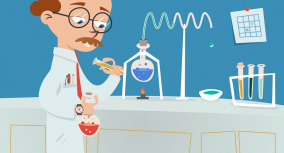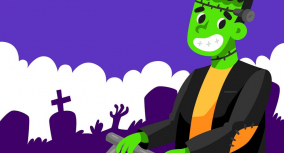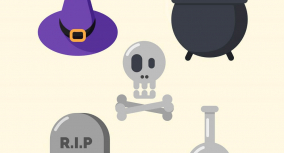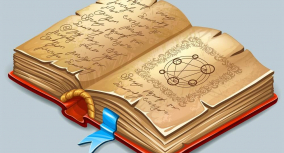
Essays About Frankenstein: Top 5 Examples Plus Prompts
Mary Shelley’s Frankenstein is one of the greatest works of literature; if you are writing essays about Frankenstein, you can start by reading some essay examples.
When we think of Frankenstein, we often picture a hulking monster. However, “Frankenstein” refers to one of two things: The novel Frankenstein by Mary Shelley, or Dr. Victor Frankenstein, the scientist who created the great beast. The monster is Frankenstein’s monster, not Frankenstein himself.
Dr. Frankenstein defies nature in the novel and creates sentient body-stitched body parts. Unfortunately, his creation turns on him, and the scientist eventually dies. The novel is a good reminder of our very nature as human beings and our place in the world.
If you want to write a good essay about Frankenstein, read these essay examples and prompts for inspiration.
1. Frankenstein by Mary Shelley: Critical Essay by Andrew Eliot Binder
2. suspense in frankenstein by sophie tyler, 3. dr. frankenstein’s three big mistakes by charlotte gordon, 4. frankenstein is a tragedy, not a romantic novel by jennifer n. adams, 5. frankenstein & gender roles by frederick hopkins, 1. why can readers empathize with the monster , 2. is franknstein “the modern prometheus”, 3. the true monster of the story, 4. lessons we can learn from frankenstein, 5. does frankenstein deserve its fame, 6. the influence of frankenstein.
“Shelley immediately likens Frankenstein to his own creation through the word “wretched,” and, in doing so, present an irony. Frankenstein deserts his “wretched” creation, who then becomes hungry and harassed by society. But when the roles are reversed, and Frankenstein is described as “wretched,” he is given “soup,” shelter, and protection from being “tormented.”
Binder’s essay compares the characters of Walton and Frankenstein, showing the importance of human relationships. Despite their similar upbringing and personality, Walton craves companionship while Frankenstein isolates himself; the former survives while the latter perishes. Binder believes that Shelley intends to show the importance of being part of society, for we will not survive without it.
“The message of the novel is that scientists should have self-control in their work to avoid becoming obsessed, otherwise this will lead to their ‘destruction’ as was the case with Frankenstein. In the novel Captain Walton learned from Frankenstein and decided to put an end to his obsession of reaching the north..”
In her essay, Tyler discusses how Shelley creates suspense in Frankenstein through word choice, the symbolism of darkness, pacing, and short sentence structure. Put together, Shelley evokes a dark, foreboding tone, showing the scientist’s terror as the novel progresses and, consequently, the message that scientists must not overstep their bounds and have restraint in their work.
“Artificial intelligence isn’t likely to kill us all—but the more people work on the problem, the more the odds go down. Frankenstein’s creature did not have to be a blight on society. He devolved into a monster of revenge because he was abandoned by his creator.”
Gordon writes about the rise of artificial intelligence and its similarity to Shelley’s Frankenstein . He describes Dr. Frankenstein’s mistakes, unwillingness to share his research with others, neglecting his creation until it was too late to stop it, and poor design due to inadequate resources. A.I. researchers can learn from these mistakes to ensure that their creations do not prove detrimental to others’ lives, as in Frankenstein or society.
“What Mary Shelley had written, was a tragedy. Both characters, Frankenstein and the monster suffered great tragedies in their life; Frankenstein suffered from the continuous loss of family and friends from his own mistake and the monster suffered a life of solitude and not having known love, kindness, or friendship.”
Adams poses a theory that Frankenstein is a tragic work of literature rather than a romantic novel. Frankenstein and the monster suffer greatly, and conflict is demonstrated against each other and in their heads. Their actions throughout the novel are a result of their tragedies. Adams does an excellent job of conveying her beliefs and presenting evidence to support her claim.
“Jane Austen once wrote ‘hate to hear you talk about all women as if they were fine ladies instead of rational creatures. None of us want to be calm waters all our lives’. This helps to sum up the possible mention of the need for the emancipation for women throughout Shelley’s book. We are introduced to varying female roles throughout the book, from Elizabeth to Safie, the ‘gender roles’ have varied in empowering one character while leaving the other to be the representation of the ‘times’.”
Hopkins’s essay discusses how Frankenstein reflects Shelley’s views on gender roles. For example, the character Justine is a “passive, submissive” woman of the time; she meets an unfortunate end. Safie, on the other hand, is more independent and brings joy to everyone when she is present. These examples, among others, reflect Shelley’s desire for society to change its attitude towards women.
Prompts on Essays about Frankenstein

A significant aspect of the story is the monster’s “humanity.” Readers can identify with his character and relationship with society. It is interesting to discuss why this could be the case. Delve into the question, “how do we relate to the monster?” Write about the different ways the monster appears more human and “worthy of empathy,” so to speak.
Interestingly, Frankenstein is suggested to be a modern version of the Greek god. Look into who Prometheus was in mythology and consider the similarities between him and Dr. Frankenstein. How is he a “modern Prometheus?” Use sources to support your findings, and create a compelling argumentative essay.
On a surface level, Frankenstein’s creation is the “monster” in the novel. However, some argue that the true monster is Frankenstein, for tampering with the creation of organic life. So who is the monster to you? There is abundant evidence to support either character; for an engaging essay, get quotes from the novel and online sources.
Behind Frankenstein lies a set of truths about humanity and some values and lessons we can learn from. What do the story and characters reveal about our inherent nature, and what lessons can we apply to our own lives? You can write about one or more, but be sure to explain them in detail.
Frankenstein is regarded as one of the most famous works of literature, on par with Romeo and Juliet, Moby Dick, and other classics. Should it be considered “one of the greats?” Based on readings and research, decide on your response and defend your position.
Particularly in the world of horror, Frankenstein has had a tremendous impact. Your essay can discuss the novel’s lasting legacy and its effects on pop culture, the science-fiction and horror genres, and literature. In addition, you should include examples of works that exhibit noticeable influence from the novel and its characters.
Check out our guide packed full of transition words for essays .
If you’re still stuck, check out our general resource of essay writing topics .

Martin is an avid writer specializing in editing and proofreading. He also enjoys literary analysis and writing about food and travel.
View all posts
Frankenstein: Essay Topics & Samples
Choosing such a masterpiece to write about is a wise choice. Mary Shelley wasn’t even going to create this novel, so it is fair enough to doubt whether there is anything to analyze at all.
Our specialists will write a custom essay specially for you!
However, there are so many ideas for essay topics about Frankenstein ! The most prominent questions relate to moral values, gender inequality, power, and isolation.
This article by Custom-Writing.org experts is here to help you if you don’t know what to write about or have an abundance of choices. Check out the following list of 10 Frankenstein essay prompts that might inspire you to create an ideal paper.
- 💡 Essay Topics
- ✒️ Essay Samples
💡 Frankenstein: Essay Topics
- Who is the actual Monster in Frankenstein ? When referring to Mary Shelley’s work, some people mistakenly think that Frankenstein is the name of the Monster. However, it can give some food for thought. Isn’t Victor the real creature of evil in this story ? The essay on who the real Monster in Frankenstein might cause a debate!
- The role of women in Frankenstein . You may write an essay about feminism in Frankenstein by looking at the female characters’ role in the book. You might have noticed that women are described as strong individuals. They can endure any challenge and overcome significant losses in their lives.
- Consider an essay on romanticism in Frankenstein . Even in such a dark novel, romantic motifs are hiding between death scenes. Mary Shelly refers to poetry quite a lot in the book. Your task would be to trace this connection and analyze the influence of romanticism on the story.
- Frankenstein as a warning about the dark sides of science. In this Frankenstein analysis essay, you should focus on science’s power and how it can be destructive. Nowadays, scientists are eager to achieve the same aim to create life. However, is it safe to play Gods this way? What may be the consequences?
- Victor Frankenstein : antagonist or protagonist? At first, the reader would assume that the Monster represents all the evil in this world. Later, however, he seems to be only a mere victim. Write this essay about Victor Frankenstein’s character analysis. Is he a real villain after what he’s done?
- The theme of loneliness in Frankenstein . It seems like Victor simply can’t accept his responsibility for the Monster’s loneliness. They both become isolated by one means or another. Compliment your writing with strong arguments to prove your point. Don’t forget that using quotes is a great strategy that would be extremely useful in this Frankenstein essay.
- What are the fears of Mary Shelley hiding in Frankenstein ? Analyze the novel thoroughly to find its hidden meaning. There are themes of life and death, as well as the speeded up technological development. Some of them are the fears of the authors that may be relevant up to nowadays.
- Frankenstein : human ambition vs. nature. After reading the book, the reader finds Victor guilty of going against nature. But isn’t it what humans have been doing for centuries now? Where is the line? Have we crossed it yet? In this Frankenstein essay example, you are invited to look at the novel as a warning.
- Mary Shelley’s Monster: why do we tend to sympathize with him? In his desire for freedom from loneliness, the Monster tends to complain a lot. However, we don’t perceive his words as whining. We pity him as an abandoned creature destined to suffer. What makes it so easy to sympathize with him?
- The theme of sickness in Frankenstein . Most of the main characters in the novel get unwell. The worst case is Victor’s recurring sickness. Admittedly, it is the result of the enormous amounts of stress he faces. What is the role of this element, though? Is he trying to escape the problems this way? Discuss these questions in your Frankenstein essay.
✒️ Frankenstein: Essay Samples
Below you’ll find a collection of Frankenstein essay examples. Use them for inspiration!
- Human Companionship in Mary Shelley’s “Frankenstein”
- The Science Debate: Mary Shelley’s Frankenstein
- The Modern Prometheus: Frankenstein by Mary Shelley
- Injustice in Shelley’s Frankenstein and Milton’s Paradise Lost
- Mary Shelley’s Frankenstein: Key Themes
- The Family Relationship in Frankenstein by Mary Shelley
- “Young Frankenstein” by Mel Brooks
- The Modern Prometheus: Analysis of Frankenstein by Mary Shelley
- Share to Facebook
- Share to Twitter
- Share to LinkedIn
- Share to email

Victor Frankenstein, a young scientist, creates a human-like creature in the course of a scientific experiment. But the beast murders his family and runs away. Science, religion, moral values, and persistence: which qualities make up a real human being? This Frankenstein Study Guide answers all your questions about the novel....

This article by Custom-Writing.org experts contains all you need to know about the Mary Shelley’s Frankenstein summary: a plot infographic of the book and a detailed description of the novel’s chapters. ❗ Frankenstein: Plot Summary Mary Shelley’s most famous novel is Frankenstein; or, The Modern Prometheus. It tells the tragic...

This article by Custom-Writing.org experts contains the description of Frankenstein’s characters: Victor Frankenstein character traits, the Monster, Robert Walton, Henry Clerval, and others. In the first section, you’ll find a Frankenstein character map. 🗺️ Frankenstein: Character Map Below you’ll find a character map of Frankenstein by Mary Shelley. 👨🔬 Victor...

This article by Custom-Writing.org experts provides an explanation of the themes of Frankenstein. The core issues represented in Mary Shelley’s book are: dangerous knowledge, nature, isolation, monstrosity, and revenge. Keep reading to learn more about the theme of Frankenstein for your class or essay! 🔑 What Are the Major Themes...

This article by Custom-Writing.org experts explains the symbolism in Frankenstein. The key symbols used by Shelley are fire and light. 🔥 Fire in Frankenstein Let’s start with the fact that the novel’s full title is Frankenstein; or, The Modern Prometheus. It is not a coincidence. We can draw a parallel...

At some point in your studying, you might be asked to produce “The Yellow Wallpaper” analysis essay. Well, if you’re reading this, you have already received this task! Let’s start by choosing a suitable topic to write about. This article by Custom-Writing.org experts contains “The Yellow Wallpaper” essay topics, “The...

This article by Custom-Writing.org experts contains all the information about The Yellow Wallpaper’s characters: the narrator, John, Mary, and Jennie. At the end of the article, you’ll learn who Jane is and how she’s related to The Yellow Wallpaper’s main character. 🗺️ The Yellow Wallpaper: Character Map Below you’ll find...

This article by Custom-Writing.org experts provides a wide-ranging and diverse explanation of The Yellow Wallpaper’s themes. The core issues represented in Charlotte Perkins Gilman’s short story are gender roles, mental illness, and freedom. Although the writer speaks about her own time, these themes are just as relevant today, if not...

This article by Custom-Writing.org experts contains a comprehensive analysis of literary devices in “The Yellow Wallpaper”: color symbolism, personification, point of view used by Gilman, foreshadowing, and an explanation of the ending’s meaning. 🌈 The Yellow Wallpaper: Symbolism How unfortunate is it that a woman has a mental breakdown just...

This article by Custom-Writing.org experts contains all you need to know about the events in “The Yellow Wallpaper”: a short summary, a plot infographic, and a detailed description of the story’s entries. In the first section, you’ll find a synopsis of what happened in “The Yellow Wallpaper” by Charlotte Perkins...

The Metamorphosis is one of Kafka’s best-known books. It is also one of the most intricate literary pieces in world literature. This is why coming up with an excellent The Metamorphosis essay topic can be challenging. The following list can help you to get started. See if any of these...

Since its publication in 1915, Kafka’s The Metamorphosis puzzled readers and critics all over the world. The story centers around Gregor Samsa’s transformation into a gigantic insect. The situation is both surreal and unusual. However, the writer proceeds with the story in a realistic manner. Nevertheless, there is a lot...
Sample Essays
Click on the links below for examples of essays that have been written by students studying Frankenstein:
Essay 1 - How are female characters portrayed in the opening chapters of Frankenstein?
Essay 2 - ‘Originally conceived as a ghost story, Frankenstein is far more – it is a story of alienation.’ Examine Shelley’s portrayal of the Creature in the light of this comment.

Shelley’s Frankenstein: What It Means to Be Human Essay
Frankenstein, a ground-breaking novel by Mary Shelley published in 1818, raises important questions about what it means to be human. Mary Shelley was inspired to write the book in response to the questions arising from growing interactions between indigenous groups and European colonialists and explorers. While the native people the Europeans encountered exhibited human characteristics, the Europeans generally viewed them as inferior and less intelligent. Therefore, at that time, there was an unending debate about whether non-European ethnicities belonged to the same species as Europeans. The contestation was largely influenced by the Enlightenment led by the philosopher David Hume, who argued that there were different species of people and non-European species were “naturally inferior to the whites” (Lee 265). As a result, the native people were positioned beneath the line dividing humans from animals. This essentially meant they would only be subjects of slavery and oppression. However, Shelly’s Frankenstein runs counter to this theory and challenges the rigid notion of being a human based on a synthetic creature made of dead bodies. The book reveals what it means to be human through the creature’s actions.
When Frankenstein was released, many people were mesmerized by stories of “wild” native tribes in distant lands. Lee (267) states that during that time, the native people were judged only based on their appearance and way of life. However, going by Shelly’s progressive and broader definition, anyone would qualify to be called a human being in their own right. Shelly’s illustration even included the “savages” that her contemporaries looked down upon. Shelly uses the classic example of a creature that could survive on a vegetarian diet and climb mountains relatively easily. Her depiction of the creature through Victor Frankenstein shows that he is innately tied to the natural world (Shelley 85). However, the horrific responses he receives from others, including his creator, causes him to live in exile away from the European culture and dwell in the woods.
Furthermore, the creature’s looks make it obvious that it is not European. It stands at “nearly eight feet tall,” is far taller than the average European, and has “yellow skin” and “straight black lips” (Shelley 59). Even though a European developed him, his physical distinctiveness “the work of muscles and arteries beneath” set him apart from others (Shelley 59). Because he has been cast out of society due to his appearance, the creature is not a party to the social contract of the Enlightenment, a tacit agreement between all members of a country to protect each other’s basic rights. When the creature meets others, they fail in their duty to protect his human rights as a group, and later in the book, he murders in retaliation. The pervasive Enlightenment conception of the social contract generates an abstract divide between “civilized man” and “natural man” (Lee 275). The contract allows man to transition out of his “state of nature” and into modern society. That is why most Europeans, the moment Frankenstein was published, would not have understood how deeply connected to nature the creature or many indigenous peoples were.
Notwithstanding the deep connection to nature, the creature is human and characterized by an emotional and often compassionate personality. Despite his young age, he is almost as emotional and just as eloquent as his creator. When Felix, a young farmer whose home he stays in for a while, attacks him, he refrains from retaliation and saves a young girl only from being shot by her male companion. He frequently exhibits more moral “human” behavior than those he meets (Shelley 130). In both instances, he exhibits kindness and mercy and is unjustly assaulted by humans who misjudge him. At one time, the creature gets confronted, causing an aggressive, malicious, and vengeful reaction. However, the creature exemplifies intense guilt at the novel’s conclusion, which characterizes humanity. The creature’s depiction as physically non-European, self-educated, and yet unquestionably human can be applied to the indigenous people in nations like South America that European explorers frequently encountered. The indigenous people were characterized by their lifestyle and appearance rather than their inherent intelligence or upbringing. They can only exist in the natural world because they are not mostly allowed to live in European culture.
In conclusion, Shelley used her book, Frankenstein, to show what it means to be human through the creature’s actions. She broadens the definition of humanity by creating a progressive vision that enables those deemed less human to be regarded as completely human. The creature’s actions, when confronted, act as a caution against the risks of treating other people with indignity. Shelley’s story urges the reader to allow everyone to prove themselves before judging them based on their appearance. She advocates for fair treatment by drawing comparisons between the creature and its existence in nature and indigenous peoples worldwide, both forms of the “other.” As shown by the creature’s actions, anyone could end up becoming what is unfairly expected of them if they are not given an equal chance because of the psychological harm caused by the way they have been treated. In the end, the discovery that both the indigenous and the creature are human but are not perceived as such in civilization exposes the flaws in the prejudiced yet obscured view of humanity held by the Enlightenment.
Works Cited
Lee, Seogkwang. “ Humanity in Monstrous Form: Reading Mary Shelley Frankenstein .” The Journal of East-West Comparative Literature , vol. 49, 2019, pp. 261–85, Web.
Shelley, Mary. Frankenstein, or, the Modern Prometheus . Legend Press, 2018.
- Chicago (A-D)
- Chicago (N-B)
IvyPanda. (2023, December 17). Shelley's Frankenstein: What It Means to Be Human. https://ivypanda.com/essays/shelleys-frankenstein-what-it-means-to-be-human/
"Shelley's Frankenstein: What It Means to Be Human." IvyPanda , 17 Dec. 2023, ivypanda.com/essays/shelleys-frankenstein-what-it-means-to-be-human/.
IvyPanda . (2023) 'Shelley's Frankenstein: What It Means to Be Human'. 17 December.
IvyPanda . 2023. "Shelley's Frankenstein: What It Means to Be Human." December 17, 2023. https://ivypanda.com/essays/shelleys-frankenstein-what-it-means-to-be-human/.
1. IvyPanda . "Shelley's Frankenstein: What It Means to Be Human." December 17, 2023. https://ivypanda.com/essays/shelleys-frankenstein-what-it-means-to-be-human/.
Bibliography
IvyPanda . "Shelley's Frankenstein: What It Means to Be Human." December 17, 2023. https://ivypanda.com/essays/shelleys-frankenstein-what-it-means-to-be-human/.
- Scientist's Role in "Frankenstein" by Mary Shelly
- Stylistics of Frankenstein by Mary Shelly
- The Ladies of Frankenstein: The Gender in Literature
- The Shelly v. Kraemer Case Decision
- Responsibility in “Frankenstein” by Mary Shelly
- Mary Shelley's Frankenstein Critical Analysis
- Motifs and Themes in Mary Shelley's "Frankenstein"
- “Frankenstein” by Mary Shelley
- Frankenstein's Historical Context: Review of "In Frankenstein’s Shadow" by Chris Baldrick
- Ethics of Discovery in Mary Shelley's "Frankenstein"
- King Lear as a Depiction of Shakespeare's Era
- Themes in "Dancing in the Dark" Novel by Phillip
- The "Dancing in the Dark" Novel by Caryl Phillip
- "Frankenstein" by Mary Shelley Review
- Lewis' The Lion, the Witch, and the Wardrobe Book

Personality of Victor Frankenstein
This essay about Victor Frankenstein, the protagonist of Mary Shelley’s “Frankenstein,” explores his complex character traits and the moral ambiguities that define his narrative. Victor is portrayed as a passionate and ambitious scientist, whose pursuit of knowledge leads him to transcend the boundaries of natural science. His obsession isolates him, driving him to work in secrecy, which eventually results in the creation of his monstrous creature. Victor’s intelligence and ingenuity are overshadowed by his profound isolation and lack of foresight, leading to significant ethical failings, particularly his inability to take responsibility for his creation. The essay highlights how these traits contribute to the tragedy that unfolds, affecting not only Victor but also those around him. Through Victor’s character, Shelley engages with themes concerning the responsibilities of creation, the ethical limits of science, and the consequences of unchecked ambition, positioning his story as a cautionary tale about the dangers of overreaching human endeavor.
How it works
Victor Frankenstein, the protagonist of Mary Shelley’s seminal work *Frankenstein*, is a complex character whose personal traits and moral ambiguities play a central role in the unfolding tragedy of the novel. Created in the dawn of the 19th century, Victor embodies the dualities inherent in mankind’s pursuit of knowledge, illustrating the fine line between genius and folly. His characteristics not only drive the plot forward but also serve to explore deeper philosophical questions regarding creation, ambition, and human responsibility.
At his core, Victor is depicted as a deeply passionate and ambitious individual, qualities that initially appear as marks of a promising young scientist. From an early age, he demonstrates an insatiable curiosity about the workings of the natural world. His quest for knowledge is profound, leading him to leave his family in Geneva to study at the University of Ingolstadt. There, he excels quickly, driven by a desire to penetrate the secrets of nature. However, Victor’s ambition soon veers into obsession. This fixation is perhaps his most defining trait, illustrating a perilous descent. His relentless drive to surpass the usual boundaries of scientific inquiry—to “bestow animation upon lifeless matter”—speaks to a hubristic desire to play God, to challenge the natural order of the world.
Victor’s intelligence and ingenuity are undeniable. He is not only a scholar but also an innovator, capable of profound insights into scientific mysteries. Yet, his brilliance is shadowed by his profound isolation. As he becomes more consumed with his experiments, he withdraws from his family and friends, cloaking his project in secrecy. This isolation is both physical and emotional, highlighting a significant aspect of his character: his inability to share his inner life and his burdens with others. This trait not only exacerbates his obsessions but also leads to a lack of accountability and perspective, which are crucial in the ethical application of science.
Despite his intellectual gifts, Victor’s fatal flaw is his lack of foresight and responsibility. After animating his creature, he is horrified by its appearance and abandons it, refusing to acknowledge his duty to the being he has created. This act of negligence reveals a profound moral failure. Victor’s initial reaction to his creation, driven by disgust and fear, leads to a series of tragic events. Instead of facing the consequences of his actions, Victor often falls into despair, showing a propensity to flee from the repercussions of his decisions.
Furthermore, Victor’s relationships offer a window into his complex emotional landscape. His connections with his family and Elizabeth, his fiancée, are steeped in affection yet marred by his secretive nature. The guilt and grief he experiences after the creature’s vengeance—the deaths of his brother William, Justine, Clerval, and Elizabeth—plunge him into anguished reflections on his actions. However, his remorse, though sincere, often lapses into self-pity rather than transformative change, illustrating a pattern of reaction rather than proactive resolution.
In sum, Victor Frankenstein is a character of profound contradictions. He is at once a visionary scientist and a tragically flawed individual, whose personal failings catalyze disaster. His passion, isolation, and lack of responsibility form a character study in the dangers of unchecked ambition and the ethical responsibilities that accompany the creation of life. Through Victor, Shelley poses enduring questions about the role of science in society and the moral considerations it must entail. His story serves as a timeless cautionary tale about the limits of human endeavor and the deep responsibilities entwined with the power of creation.
Cite this page
Personality Of Victor Frankenstein. (2024, Apr 29). Retrieved from https://papersowl.com/examples/personality-of-victor-frankenstein/
"Personality Of Victor Frankenstein." PapersOwl.com , 29 Apr 2024, https://papersowl.com/examples/personality-of-victor-frankenstein/
PapersOwl.com. (2024). Personality Of Victor Frankenstein . [Online]. Available at: https://papersowl.com/examples/personality-of-victor-frankenstein/ [Accessed: 4 May. 2024]
"Personality Of Victor Frankenstein." PapersOwl.com, Apr 29, 2024. Accessed May 4, 2024. https://papersowl.com/examples/personality-of-victor-frankenstein/
"Personality Of Victor Frankenstein," PapersOwl.com , 29-Apr-2024. [Online]. Available: https://papersowl.com/examples/personality-of-victor-frankenstein/. [Accessed: 4-May-2024]
PapersOwl.com. (2024). Personality Of Victor Frankenstein . [Online]. Available at: https://papersowl.com/examples/personality-of-victor-frankenstein/ [Accessed: 4-May-2024]
Don't let plagiarism ruin your grade
Hire a writer to get a unique paper crafted to your needs.

Our writers will help you fix any mistakes and get an A+!
Please check your inbox.
You can order an original essay written according to your instructions.
Trusted by over 1 million students worldwide
1. Tell Us Your Requirements
2. Pick your perfect writer
3. Get Your Paper and Pay
Hi! I'm Amy, your personal assistant!
Don't know where to start? Give me your paper requirements and I connect you to an academic expert.
short deadlines
100% Plagiarism-Free
Certified writers
Home — Essay Samples — Literature — Frankenstein — The Analysis Of Frankenstein
The Analysis of Frankenstein
- Categories: Frankenstein
About this sample

Words: 1278 |
Published: Apr 29, 2022
Words: 1278 | Pages: 3 | 7 min read

Cite this Essay
Let us write you an essay from scratch
- 450+ experts on 30 subjects ready to help
- Custom essay delivered in as few as 3 hours
Get high-quality help

Prof Ernest (PhD)
Verified writer
- Expert in: Literature

+ 120 experts online
By clicking “Check Writers’ Offers”, you agree to our terms of service and privacy policy . We’ll occasionally send you promo and account related email
No need to pay just yet!
Related Essays
3.5 pages / 1506 words
3 pages / 1465 words
3 pages / 1322 words
4.5 pages / 1980 words
Remember! This is just a sample.
You can get your custom paper by one of our expert writers.
121 writers online
Still can’t find what you need?
Browse our vast selection of original essay samples, each expertly formatted and styled
Related Essays on Frankenstein
In Mary Shelley's iconic novel Frankenstein, the use of foreshadowing plays a crucial role in building tension and suspense throughout the narrative. From subtle hints to more overt clues, the author skillfully weaves a web of [...]
Prejudice is a recurring theme in Mary Shelley's novel, Frankenstein. Through the interactions and perceptions of various characters, Shelley explores the detrimental effects of prejudice on both the individual and society as a [...]
The theme of isolation is a prevalent and significant aspect in Mary Shelley's novel, Frankenstein. Throughout the narrative, both Victor Frankenstein and his creation, the Monster, experience various forms of isolation, which [...]
Mary Shelley’s novel, Frankenstein, explores the dangers of the relentless pursuit of knowledge and the consequences of playing god. Through the character of Victor Frankenstein, Shelley delves into the pitfalls of unchecked [...]
The classic 1818 novel Frankenstein, written by author Mary Wollstonecraft Shelley, is without a doubt an essential piece of literature. This critically acclaimed novel presents the monster, one of literature’s most intriguing [...]
The concept of the Other is understood through its division from the Self. Specifically, Otherness represents those who run counter to predominant societal ideologies; thus, the Other, denounced as a threat to norms, is shunned [...]
Related Topics
By clicking “Send”, you agree to our Terms of service and Privacy statement . We will occasionally send you account related emails.
Where do you want us to send this sample?
By clicking “Continue”, you agree to our terms of service and privacy policy.
Be careful. This essay is not unique
This essay was donated by a student and is likely to have been used and submitted before
Download this Sample
Free samples may contain mistakes and not unique parts
Sorry, we could not paraphrase this essay. Our professional writers can rewrite it and get you a unique paper.
Please check your inbox.
We can write you a custom essay that will follow your exact instructions and meet the deadlines. Let's fix your grades together!
Get Your Personalized Essay in 3 Hours or Less!
We use cookies to personalyze your web-site experience. By continuing we’ll assume you board with our cookie policy .
- Instructions Followed To The Letter
- Deadlines Met At Every Stage
- Unique And Plagiarism Free

IMAGES
VIDEO
COMMENTS
A+ Student Essay: The Impact of the Monster's Eloquence. The monster in Mary Shelley's Frankenstein lurches into life as big as a man but as ignorant as a newborn. He can't read, speak, or understand the rudiments of human interaction. When he stumbles upon the cottagers, however, he picks up language by observing them and studying their ...
📝 Frankenstein: Essay Samples List. Frankenstein, by Mary Shelley, is famous all over the world.School and college students are often asked to write about the novel. On this page, you can find a collection of free sample essays and research papers that focus on Frankenstein.Literary analysis, compare & contrast essays, papers devoted to Frankenstein's characters & themes, and much more.
102 essay samples found. Frankenstein is a novel by Mary Shelley, often heralded as one of the first pieces of science fiction, exploring themes of creation, ambition, and the moral implications of scientific advancement. Essays on "Frankenstein" could delve into these themes, the character analysis of Victor Frankenstein and the Creature ...
Sample Essay Outlines. Discuss the true nature and personality of the creature in Shelley's Frankenstein. I. Thesis Statement: Although the creature behaves viciously and murders several people ...
Frankenstein by Mary Shelley: Divine and Satanic. Hetherington adequately concludes that Victor Frankenstein is a symbol of God through the creation of a new being, and the monster is a symbol of Satan due to his deeds. Mary Shelley's "Frankenstein" and H.G. Wells's "The Island of Dr. Moreau".
The novel "Frankenstein" written by author Mary Shelly is familiar to people across the world because of its engaging and romantic plot. The character of the monster is one of the most famous in the world, but this masterpiece is not only known by its mysterious entourage, but also by the great and of interesting plot and characters. So, in the essays on Frankenstein, it is better to ...
Welcome to the Frankenstein Essay Topics page prepared by our editorial team! Here, you'll find a selection of top ideas, questions, and titles for any academic paper. We have topics about Frankenstein's literary analysis, characters, themes, and more. We will write a custom essay specifically. for you for only 11.00 9.35/page.
Summary of Frankenstein. The text is told in an epistolary narrative form using three narrators: Robert Walton, Victor Frankenstein, and the monster. The novel begins with a series of letters by Walton, an arctic explorer, to his sister. He writes of his encounter with a weakened Victor on the ice, who he nurses back to health aboard ship.
1. Frankenstein by Mary Shelley: Critical Essay by Andrew Eliot Binder. "Shelley immediately likens Frankenstein to his own creation through the word "wretched," and, in doing so, present an irony. Frankenstein deserts his "wretched" creation, who then becomes hungry and harassed by society. But when the roles are reversed, and ...
Critical Survey of Science Fiction and Fantasy Frankenstein Analysis. Mary Shelley wrote Frankenstein as part of a friendly ghost story writing competition with her husband, Percy Bysshe Shelley ...
The character of Victor Frankenstein is a complex and multi-faceted one. He is both a hero and a villain, driven by ambition and haunted by guilt. Through his story, Shelley invites readers to reflect on the human condition and the choices we make in the pursuit of knowledge and ambition. Victor serves as a cautionary example, a reminder that ...
Published: Mar 16, 2024. Mary Shelley's novel, Frankenstein, explores the theme of revenge through the characters of Victor Frankenstein and his creation. The pursuit of revenge drives the actions of both characters, leading to tragic consequences for themselves and those around them. Revenge serves as a central motivator in the novel ...
5. 230. In conclusion, "Frankenstein" tells of a young boy named Frankenstein who attempted to create life, though he succeeded the experiment turned out to be scary and wrecked havoc. The novel shows as much as science is innovative and interrelated with humanity, ethical issues should also be taken into consideration for most so that ...
Frankenstein Essay Examples. A Comprehensive Analysis Gothic literature, with its hard aggregate of darkness, thriller, and the supernatural, has prolonged fascinated readers with its functionality to awaken worry and suspense. Mary Shelley's "Frankenstein" often appears as a fundamental example of the gothic fashion, characterized through its ...
Sample: 3B Score: 6 . This essay on Mary Shelley's novel . Frankenstein . chooses a work that fits the prompt especially well, focusing on the effect of natural settings, in particular the effects of weather and seasons on the character that the essay refers to as "the monster." The essay makes headway in the second paragraph with reasonable
Below you'll find a collection of Frankenstein essay examples. Use them for inspiration! Human Companionship in Mary Shelley's "Frankenstein". The Science Debate: Mary Shelley's Frankenstein. The Modern Prometheus: Frankenstein by Mary Shelley. Science in Shelley's "Frankenstein" and Condorcet's Works. Injustice in Shelley's ...
Sample Essays. Click on the links below for examples of essays that have been written by students studying Frankenstein: Essay 1 - How are female characters portrayed in the opening chapters of Frankenstein? Essay 2 - 'Originally conceived as a ghost story, Frankenstein is far more - it is a story of alienation.'.
The monster is responsible for many violent actions throughout the novel. He is also legitimately frightening and grotesque because of his enormous size and composition from parts taken from corpses. At the same time, the monster encounters persistent rejection and loneliness. He struggles to find a sense of family and community, and is ...
Frankenstein, a ground-breaking novel by Mary Shelley published in 1818, raises important questions about what it means to be human. Mary Shelley was inspired to write the book in response to the questions arising from growing interactions between indigenous groups and European colonialists and explorers. While the native people the Europeans ...
Historical Context Essay: Frankenstein & the Scientific Revolution. In Frankenstein, the reckless pursuit of scientific discovery leads to chaos, tragedy, and despair for all of the novel's characters. Because so many characters suffer as a result of scientific advances, many critics read the book as a critical response to the Scientific ...
Essay Example: Victor Frankenstein, the protagonist of Mary Shelley's seminal work *Frankenstein*, is a complex character whose personal traits and moral ambiguities play a central role in the unfolding tragedy of the novel. Created in the dawn of the 19th century, Victor embodies the dualities
Published: Apr 29, 2022. Frankenstein, originally by Mary Shelly, is a compelling narrative on morality. It begins in a flash-forward through the eyes of ship captain Watson, an explorer still wet behind the ears. Longing for his name to be secured in immortality, Watson tries to be the first person to make it to the furthest reaches of the ...